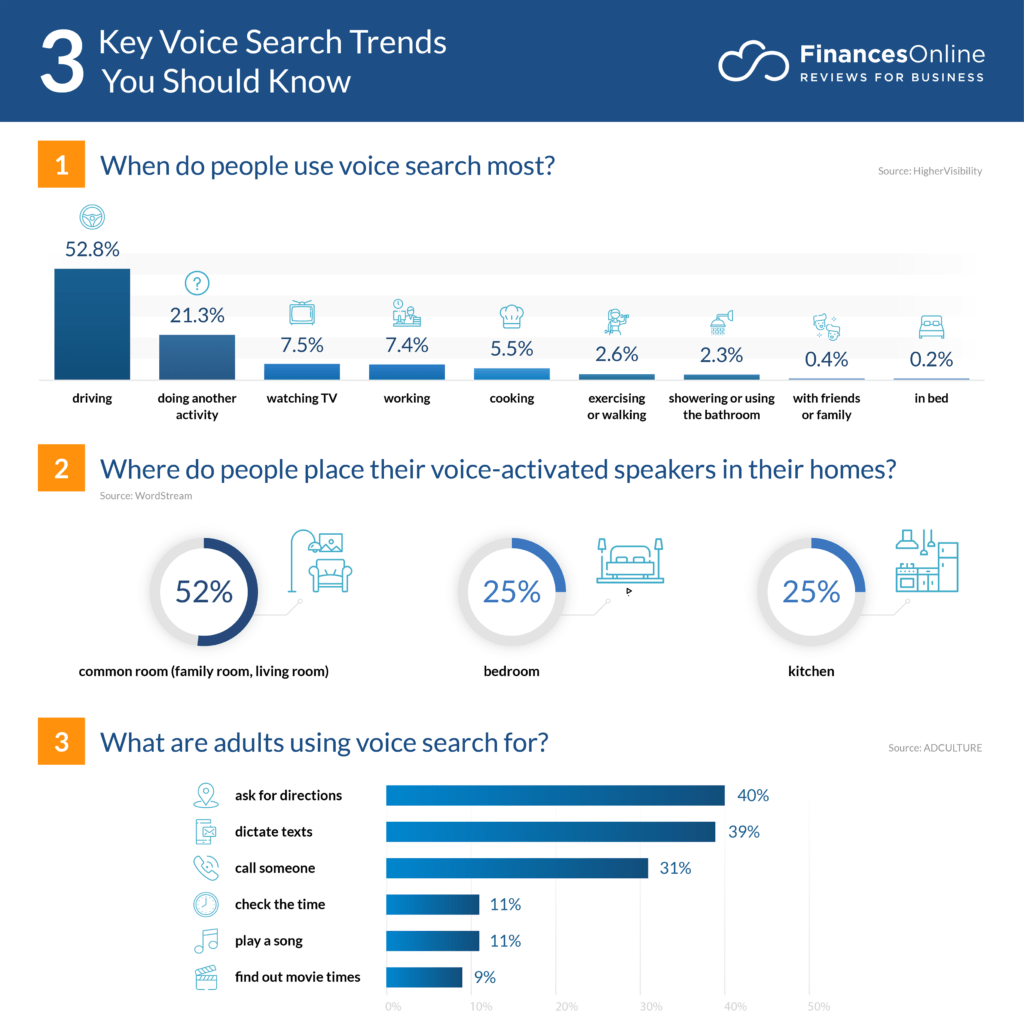Hello innovators! Have you pondered whether voice search optimization is essential for your website? The landscape of voice search optimization (VSO) is rapidly evolving, and recent statistics highlight its growing significance. In 2025, voice search technology is not just a convenience but a pivotal element in digital interaction, with a range of uses from shopping to information gathering.
In this guide, we’ll discuss why voice search optimization is not just a trend, but a necessity. We’ll explore key strategies that can elevate your website’s performance in voice search results, ensuring that you’re not just keeping up, but leading the digital race. Stay tuned as we unveil the secrets to mastering voice search optimization!
A substantial 52% of smart speaker owners use their devices for online shopping, indicating a significant shift in consumer behavior towards voice-activated commerce. Approximately 56% of users employ voice search on their smartphones to find information about brands or businesses.
- Understanding the rise of voice search
- What is Voice Search Optimization?
- 11 Key strategies for voice search optimization
- 1. Matching the intent of queries
- 2. Optimize for featured snippets
- 3. Enhance brand discoverability
- 4. Optimize for local searches
- 5. Generate audio-visual content
- 6. Improve website speed and mobile optimization
- 7. Implement structured data markup
- 8. Utilize long-form content
- 9. Secure your website with HTTPS
- 10. Leverage social media platforms
- 11. Regularly update and refresh content
- Voice search analytics and monitoring
- The Future of Voice Search
Understanding the rise of voice search
About 40% of Americans who have access to the internet use a voice assistant at least once a month, mostly on mobile devices and smart speakers. By 2028, over 27.8 billion smart speakers will be in use in the United States.
However, this integration into our routines comes with a significant twist: a voice search is not a mirror image of its text-based counterpart. When we verbally express our queries to our devices, the language and structure differ considerably from the typed searches we’ve grown accustomed to. It’s a reflection of how we naturally speak in real life, marking a dynamic shift that demands SEO experts and marketers not just to acknowledge but to deftly respond to as they navigate the ever-evolving landscape of online search behavior.

Voice search typically involves more conversational, long-tail keywords compared to the more concise terms used in text searches. This necessitates a revised SEO strategy that accounts for the nuances of spoken language, to ensure that content remains relevant and easily discoverable in this evolving landscape of search behavior.
What is Voice Search Optimization?
Voice Search Optimization (VSO) is the process of optimizing your website’s content to appear in voice search results. The key difference between traditional search and voice search is that voice searches tend to be more conversational and often in the form of a question. To optimize for voice search, focus on long-tail keywords and question-based queries. Create content that directly answers questions concisely and clearly. Use natural language and ensure that your website is mobile-friendly, as most voice searches are done on mobile devices. Additionally, having a fast-loading website and including structured data can help improve your visibility in voice search results.
Also read: Mobile SEO: How To Optimize Your Website for Mobile Devices
11 Key strategies for voice search optimization
The following proactive measures can elevate your website for voice search, ensuring it resonates with the growing population of voice search users.
1. Matching the intent of queries
Recognizing the user’s underlying intent behind voice queries ensures that your content directly addresses the actual question or purpose of the search. Begin by conducting comprehensive keyword research to understand the varied ways users express their queries vocally. Develop content that not only aligns with these diverse expressions but also provides in-depth, relevant answers. Utilize natural language processing techniques to decipher the nuances of user intent and refine your content accordingly.
By prioritizing intent matching, you not only enhance the accuracy of your content in voice search results but also establish your website as a reliable source that precisely caters to the needs and queries of your audience.
2. Optimize for featured snippets
As virtual assistants increasingly rely on Featured Snippets to provide quick and concise answers, securing this coveted position becomes paramount. Start by crafting comprehensive FAQs and regularly update and refine your FAQs to stay ahead of evolving voice search trends. Implement structured data markup, such as Schema.org, to signal to search engines that your content is primed for snippet extraction. By prioritizing Featured Snippets, you not only enhance your website’s performance in traditional searches but also position yourself for success in the dynamic landscape of voice search.
While reading these key Voice Search Optimization strategies you may like Are SEO Services a Good Investment for Small Businesses?
3. Enhance brand discoverability
To boost brand recognition in voice search, it’s crucial to integrate various versions and pronunciations of your brand name. This deliberate and strategic approach is aimed at aiding voice assistants in accurately identifying and articulating your brand. By ensuring that your brand is pronounced correctly, you guarantee a seamless user experience, eliminating potential confusion in voice-activated interactions. Overall it enhances the discoverability of your brand in voice searches.
4. Optimize for local searches
Users are leveraging voice commands to discover nearby establishments and resources, emphasizing the need for strategic measures. One essential tactic is claiming and meticulously maintaining an accurate Google My Business listing. This not only ensures visibility but also aligns your business with voice search preferences. Additionally, incorporating relevant local keywords and providing precise location information throughout your website seamlessly integrates your content into the voice search landscape, enhancing discoverability for users seeking local information.
5. Generate audio-visual content
Create content in audio and video formats to improve the overall user experience in voice searches. By incorporating audio content, such as podcasts, and video content, such as instructional videos or vlogs, businesses can cater to the preferences of users engaging with voice search. When users make voice queries, search engines may respond by playing audio content or displaying relevant video snippets directly in the search results. Furthermore, including transcriptions for audio and video content is essential for accessibility and aids search engines in understanding the context
6. Improve website speed and mobile optimization
Users demand instant, hassle-free results when conducting voice searches on their mobile devices. Mobile-friendly sites are given more weight in Google’s mobile-first indexing. Make sure your site is fast and responsive on mobile devices. Websites that load quickly and adapt to mobile devices are more likely to do well in search engine results.
7. Implement structured data markup
By using structured data markup, you can help search engines better grasp the content of your website. Using this markup will aid search engines in providing appropriate results in response to voice queries by providing additional context about your material. Common markup formats include Schema.org and JSON-LD. For those not tech-savvy users the viable option is to opt for website development services for professional assistance.
8. Utilize long-form content
Take advantage of long-form content to explore topics in-depth, offering thorough responses to user queries. When search interactions are often driven by voice assistants like Siri or Google Assistant, it’s important to note that these AI technologies tend to favor more extended and detailed content when delivering search results. By incorporating comprehensive information into your content, you cater to the preferences of voice assistants and optimize your material for effective voice search outcomes.
9. Secure your website with HTTPS
As voice search emphasizes user trust and security, having a secure website is essential. Ensure that your website is served over HTTPS to encrypt data and provide a secure browsing experience for your users. If you need assistance implementing HTTPS or managing website security, consider consulting a reputable website development company that specializes in secure website development.
10. Leverage social media platforms
Voice search optimization goes beyond your website, encompassing diverse online platforms. Actively engage with your audience on social media, not only by encouraging interaction but also by monitoring brand mentions, questions, and conversations. Understand the language people use in association with your brand to refine your voice search strategy. Additionally, post audio/video content on social channels for indexing, and consider hosting social Q&A sessions to further enhance your online presence and voice search performance.
11. Regularly update and refresh content
Keep your content current and relevant to maintain a strong online presence. Search engines favor websites that consistently provide up-to-date and valuable information. Regularly audit your content, update outdated information, and refresh your website to align with evolving industry trends.
Voice search analytics and monitoring

Implementing voice search optimization strategies is not a one-time task; it requires continuous monitoring and adaptation. Utilize analytics tools to track the performance of your website in voice search results. Pay attention to the specific queries that lead users to your site and adjust your content accordingly.
With 51% of voice search users looking up restaurants or cafes, followed by industries like grocery stores, food delivery, and clothing store. This statistics demonstrate the critical role of VSO in modern digital marketing strategies.
Also Read: Why Does Technical SEO Matter to Your Business?
The Future of Voice Search
The prominence of voice search is poised to grow even further as technology continues to advance. Therefore, integrating voice search optimization into your overall digital strategy is not just a trend; it’s a strategic imperative. By staying proactive and responsive to the evolving needs of users, businesses can secure a competitive edge in the online marketplace.
If you follow the aforementioned steps, search engines are likely to see your site favorably, allowing you to draw in more users via voice searches. The SEO of your site will improve even if you don’t observe changes right away. Siri, that seems like a win-win situation.
In conclusion, optimizing websites for voice searches is more than just a technical improvement; it represents a fundamental change in how people find and use information online. Accept this change, modify your content to better suit voice search, and set up your site to be easily found and relied upon in the age of conversational searches. Those who master voice search will be at the vanguard of online success as the digital landscape continues to change.










Leave a Reply